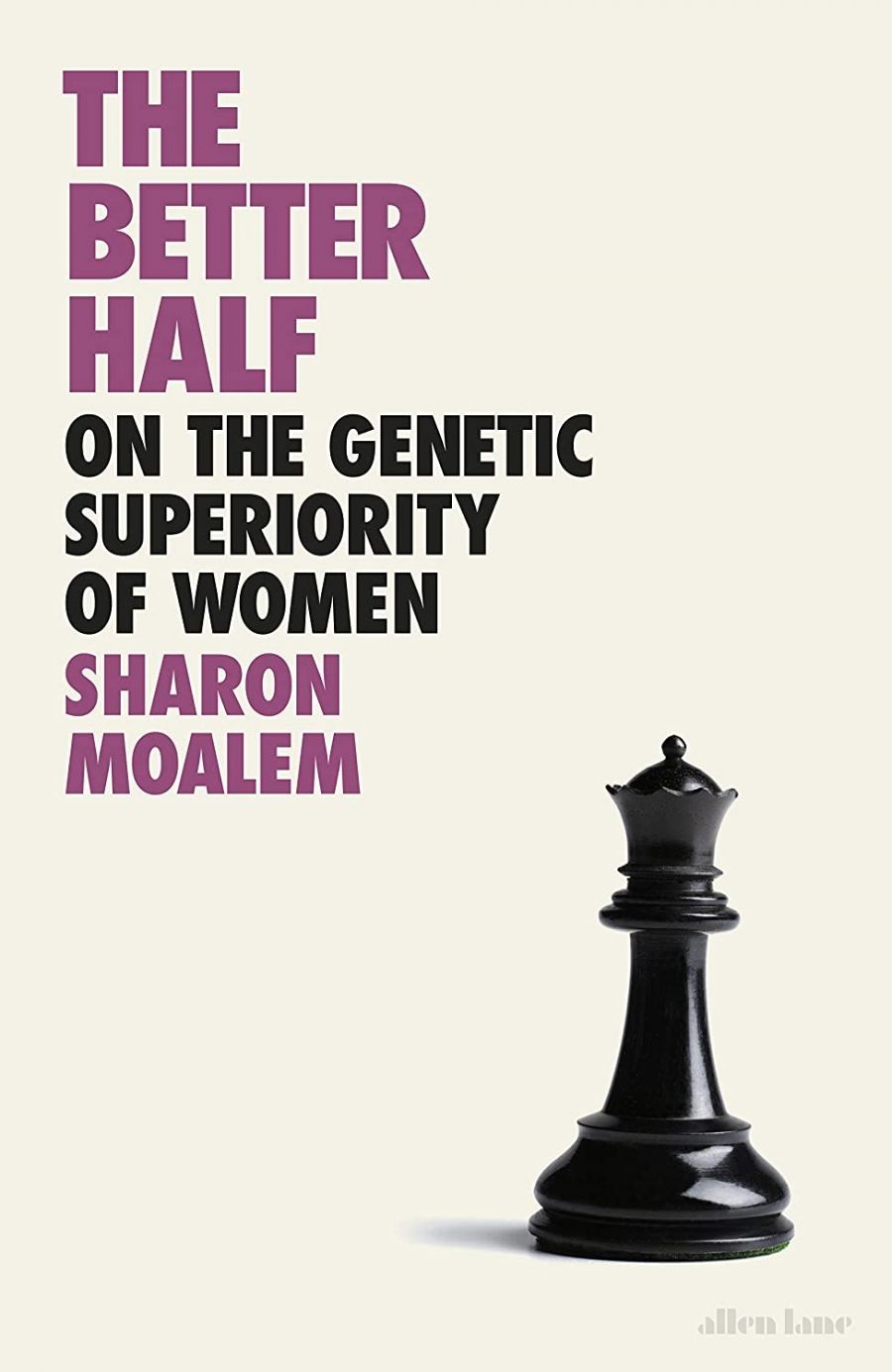
- Free Article: No
- Contents Category: Society
- Review Article: Yes
- Online Only: No
- Custom Highlight Text:
All authors who are releasing new books during the global pandemic are at a disadvantage, but some less so than others. It helps to have a title that speaks to the moment, which The Better Half, with its central thesis that women are ‘genetically privileged’, certainly does. The coronavirus, we have learnt, tends to affect men more severely than women. Some have attributed the discrepancy to men being more likely to engage in risk-taking or health-compromising behaviours, while other experts have advanced a genetic explanation.
- Grid Image (300px * 250px):

- Book 1 Title: The Better Half
- Book 1 Subtitle: On the genetic superiority of women
- Book 1 Biblio: Allen Lane, $29.99 pb, 288 pp
- Book 1 Readings Link: booktopia.kh4ffx.net/zYnze
Pandemic aside, The Better Sex, with its provocative premise about women’s genetic superiority, was bound to get attention. Moalem’s tone is breezy and appealingly authoritative; his arguments are digestible and easy to follow; and his suggestions for how scientific and medical research could be less sexist are politely made – indeed, he’d never use such a blunt word as ‘sexist’. The Better Sex is custom-made for excerpts in weekend magazines, luring readers with a finely honed blend of absorbing facts, common-sense logic, and palatably right-on sexual politics. Now onto his fifth book of popular science – previous titles include The DNA Restart: Unlock your personal genetic code to eat for your genes, lose weight and reverse aging (2016) – Moalem has obviously cracked the formula for success in a market that thrives on titles about sexual difference. In this problematic genre, he stands out as an agreeable and trustworthy narrator who appears to be genuinely motivated by compassion, curiosity, and a desire to reform his profession for the greater good. It’s a pity, then, that in most chapters his central premise is stretched to its limits.
 Dr. Sharon Moalem taken at a talk given in Tokyo, Japan (photograph by Natia Rekhviashvili/Wikimedia Commons)
Dr. Sharon Moalem taken at a talk given in Tokyo, Japan (photograph by Natia Rekhviashvili/Wikimedia Commons)
Moalem’s argument is that the female XX chromosomes have given women the genetic edge, endowing them with genetic diversity and a more robust immune system. On average, they live longer, die in fewer numbers from serious diseases like cancer, are less likely to have autism, are better at fighting viruses, and are more likely to survive epidemics and famines, compared to humans with XY chromosomes. The extra X chromosome is key. Whereas it was once scientifically assumed that one X was ‘silent’, the other ‘active’, it turns out that about a quarter of the genes on the ‘silenced’ X chromosome are ‘still active and accessible to female cells’, providing ‘extra genetic horsepower to each cell’. Hence, ‘women are the stronger sex’, with ‘more tools in their genetic toolkit’. There are potential downsides to what Moalem calls ‘immunological overactivity’, most notably that women are far more likely to be affected by an autoimmune condition like lupus or multiple sclerosis. In general, however, from birth right through to death, females have ‘immune privilege’.
For many of us, Moalem’s arguments help explain what we instinctively or anecdotally know to be the case, at least when it comes to less controversial and well-documented phenomena such as women outliving men. At his best, he does not overplay his hand and takes care to refine and qualify his overarching thesis. Occasionally, he even leaves it open-ended under the banner of ‘we need more research’.
There is still a lot we don’t know, for instance, about the role and effects of hormones. The introduction and the opening two chapters are clearly the strongest, offering both a primer on chromosomes (including recognition of chromosomal diversity) and a larger case for why better understanding the human immune system is an urgent imperative. We may no longer need reminding, but it was nevertheless still bracing to read in the midst of lockdown that ‘surviving in the pathogenic soup we live in is one of the biggest challenges we face as human beings’.
Unfortunately, however, The Better Half, while often compelling, does not quite cohere. One clue as to why is in the title. As Angela Saini documented so effectively in her 2017 book Inferior: How science got women wrong, research into sexual difference has historically been oriented towards ‘proving’ that women are the weaker sex. Accordingly, it’s been very well-funded. Under scrutiny, much of it does not stand up, inflating minor differences into truth claims that support the gender status quo. In flipping the script, Moalem offers an antidote and challenge to historical and enduring trends in scientific research, but he does not quite escape the essentialist conventions of the ‘women are this, men are that’ format.
He sincerely endeavours to break the generic boundaries, giving overdue credit to female scientists and the occasional nod to social context and behaviour. But in order to prop up a central idea about sexual difference, Moalem goes on unnecessary tangents, padding out his chapters with vaguely relevant travelogues and case studies. At one point, women are likened to potatoes; at another, he shares one of his ‘breakthroughs’ as a physician – his patient Samantha was not suffering from incontinence during sex, but rather she was ejaculating.
Once again, the thesis is proved, more or less.


Comments powered by CComment